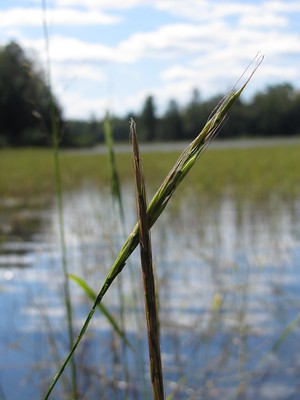Manoomin (wild rice) Deserves Enhanced Protections
A recent incident of illegal harvest, even if accidental, highlights need for a conversation about protecting this important ecological, cultural, and spiritual species
By Michael Engleson, Executive Director
October 25, 2023

A recent incident involving a wild rice bed in northern Wisconsin brings to light the need for better education of waterfront property owners about the importance of wild rice as an environmental and cultural asset and the associated laws, regulations, and treaty rights that come with it. More importantly, this incident raises questions of whether the standards and the penalties for violations of those laws and rights are sufficient.
While reporting on the incident is somewhat limited, according to the Spooner Advocate and based on additional information Wisconsin Lakes obtained from the Wisconsin Department of Natural Resources, in September a riparian landowner on Dilly Lake in Washburn County was observed by tribal members of the Lac Courte Oreilles band of Lake Superior Ojibwe removing entire plants of wild rice (“manoomin”) from an area in front of the riparian’s property in order to clear a navigational path to their shoreline.
While riparian owners are in general allowed under Wisconsin law to remove aquatic vegetation to create a navigational channel from their shore, a permit is expressly required in the case of wild rice. Tribal and DNR authorities were alerted and the riparian owner was issued a citation of $303. The landowner reportedly agreed to restore the rice bed. The citation was referred to the district attorney but we are not aware of any further action being taken. The tribe subsequently issued a statement regarding the incident.
Just because state law allows riparian owners to remove aquatic vegetation to gain navigational access from the shore to the greater lake without a permit, there remains a need to understand the plants being removed and their relation to the ecological health of the lake, no matter the species.
But especially In northern waters where manoomin is predominantly found, knowing what is being removed is all the more important. Wild rice not only plays an important role ecologically in northern lakes, it also is a huge cultural and spiritual component of the indigenous peoples of the state and is becoming more and more so for non-tribal residents as well. As such, it deserves the special protection it receives.
Wisconsin Lakes believes it’s time for Wisconsin to seriously consider whether the protections the state offers to manoomin are sufficient. Aquatic plants in general, but manoomin especially, are facing much larger threats than in the past. More development on lakes and streams in rice’s geographical territory means interactions like the one seen on Dilly Lake are more likely. Properties not adjacent to rice beds can impact the plant by contributing to polluted runoff and lower water quality if they fail to employ sustainable shoreline management practices. Larger, more powerful watercraft such as wakeboats create wave actions in size, power, and direction not previously seen on inland lakes that can swamp and negatively impact aquatic plant communities.
Wisconsin Lakes is committed to working with tribal and other partners to raise awareness of this important species of aquatic vegetation, and ensure the state provides it the protection it deserves.

